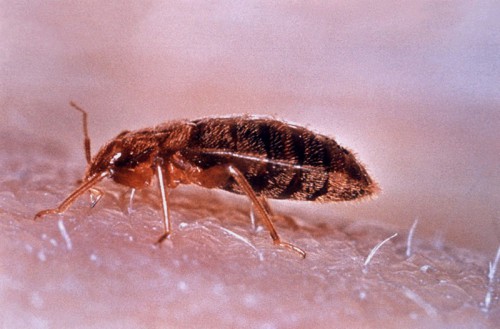MUTANT bed bugs are becoming increasingly difficult to kill, leading to a rise in infestations in Scottish homes.
Experts warn that genetic mutations of the repellent pests have developed a resistance to the most commonly used insecticides, making them twice as difficult to exterminate.
Michael Siva-Jothy, Professor of Entomology at University of Sheffield, said scientists and policy makers are currently in talks over the best way to treat the bed bug problem.
He warned that bed bugs could soon become resistant to all our available treatments, unless the situation is properly managed.

Prof Siva-Jothy said: “Bed bugs are becoming resistant to the most commonly used insecticides, called pyrethroids. If you go out to infested houses then you will find that these bugs are very resistant to standard chemicals being used to treat them.
“What we are seeing here is evolution in action, genetic changes in bed bugs produce resistance to insecticides and in many cases patterns of pesticide use by home owners and pest control companies is making the situation worse.
“There is a big problem with home owners and pest controllers using increasing doses of the same pesticide to kill bed bugs, in the long term this will just make them more resistant. We don’t want to end up with a situation where bed bugs become resistant to all our available treatments.
“Scientists and policy makers are currently in talks over the best way to treat the problem, but effective treatment may be more expensive and requires a longer term oversight, and perhaps even government control, although people may not be happy about that. We will find a solution.”
Infestations
The professor explained that more education was needed to help people spot bed bugs.

He said: “People often don’t realise they have bed bugs until it’s too late. A lack of education means people don’t know what bed bugs look or smell like. If more people could identify bed bugs then they could track them down more easily, stop infestations growing and stop them from spreading.
“From taking phone calls on the subject and speaking to people who work in the pest control industry we are very aware that this is a growing problem across Scotland, and the rest of the UK.”
The Royal Environmental Health Institute in Scotland (REHIS) has warned that bed bugs have become a “major public health issue” inScotland.
Clean houses and hotels are as much at risk from the miniature pests as poorer dwellings.
Misconceptions
REHIS council-member, Andrew McPherson, warned that affluent areas of the country were just as likely to be affected.
Mr McPherson, said: “Despite common misconceptions, bed bugs are not the sole domain of the poorer parts of our communities as they are found in more affluent areas too.
“Their name is also a bit of a misnomer as bed bugs will be found in many different places including shops, schools, hospitals and laundries and in luggage and sofas as well as behind picture frames and wallpaper too.
“Clearly there are major public health issues here and whilst Local Authority’s environmental health departments and private contractors continue to work hard to manage the problem it is essential that the public is aware of the problem and of the precautions they must take to help reduce the problem.”
Fully grown bed bugs measure around 5mm long and leave clusters of dark brown or black spots on infested surfaces. They can also exude a subtle, sweet and musty odour.
Bed bugs can also feed on human blood and finding small red insect bites on your body is often a warning that you have a bed bug problem.
Bites are typically not felt, but frequent feeding can disrupt people’s sleep and can cause emotional distress.
‘Bed bugs are everywhere’
Gavin Lindsay, manager at Anglo Scottish pest control, said he had seen a 1200% rise in the number of reported bed bug infestations across Scotland in the last ten years.
He explained: “Ten years ago we had two or three calls a year to treat bed bugs and now it’s easily seven calls a week. Bed bugs are everywhere and can affect anyone.
The spread of bed bugs in Scotland is generally down to cheaper flights which make it easier getting from A to B, second hand furniture and people staying in hotels that are infected.
“We are finding that bed bugs are becoming immune to the insecticides that we are using and it often takes twice as many treatments to kill them.”
Tom McLery, contract supervisor at Total Pest Solutions (Scotland) added: “We have recently had to change our products because we have found it more difficult to control bed bugs.
“At the moment we are using a stronger level of our active ingredient. Whereas before it would take two treatments to get rid of them, we are finding it is now taking at least three or four sessions.”

